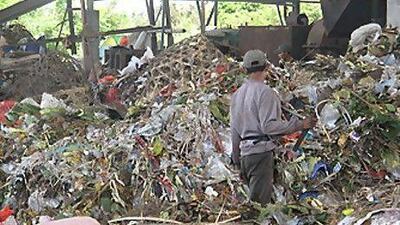As sightseeing trips go, a visit to Temesi, 26km north-east of Denpasar, the provincial capital of the holiday island of Bali, is undoubtedly an eye-opener. But it is one that assails the sense of smell, too.
When the tourist buses halt just outside the village, passengers who have neglected to check the day's itinerary in advance, and absent-mindedly expect to disembark at a temple or craft workshop, are surprised to find themselves at the entrance to a large rubbish dump.
After one glance and intake of breath, some squeamish tourists decline to proceed on the guided tour. Those not deterred by the spectacle and odours soon learn that in this little-known corner of Indonesia, an old saying from northern England holds true: where there's rubbish, there's money - or in the correct Yorkshire vernacular, where's there's muck, there's brass.
The Temesi Recycling Facility may seem an odd attraction for holidaymakers and also an unlikely proposition as a going concern, but the relentless activity that visitors notice amid the debris of everyday life ensures the project pays its way.
The teams of workers seem philosophical about their surroundings to the extent that many take their meal breaks without leaving the piles of waste. Their job is to separate the biodegradable and recyclable material from that which cannot be salvaged.
Each year, they process about 20,000 tonnes of rubbish. The painstaking sifting of the detritus ensures 90 per cent is recycled, the rest going to landfill.
Taking all the waste generated by residents and holidaymakers in the regency of Gianyar, Bali's most populated district after Badung, the centre produces almost 5,000 tonnes of high-quality compost each year. It estimates its activities will, over 10 years, prevent more than 135,000 tonnes of greenhouse gases from being pumped into the atmosphere that would otherwise result from burning the waste.
The project is seen as so important, potentially an example that could be followed elsewhere in Indonesia and in other countries, that it receives significant international financial and academic support. Operational since 2004, the plant has grown into a "viable full-size model for replications".
Among the external supporters is the Swiss Kuoni travel company, which pours money into the Temesi project as part of its "sustainable tourism" programme, the resources coming from the proceeds of the group's carbon credits earnings.
Matthias Leisinger, the head of corporate responsibility for Kuoni, said the company's commitment began modestly in 2004 at about €7,000 (Dh32,721) a year to an average of €100,000 now.
He said independent auditing was conducted into the operation of the centre, including staff conditions, to ensure appropriate standards were met. Temesi sells its compost to golf-course operators, hotels and other businesses serving Bali's tourism industry.
Mr Leisinger said Kuoni's involvement reflected its sense of environmental responsibility but added that efficient waste management also made good sense for the tourism interest of the island.
"It really is a win-win situation," he said. "We are looking for opportunities for similar projects. The Indonesian government is very interested in the work being done at Temesi, and we are also considering possible programmes in other Kuoni destinations."
The project was initiated by the rotary club of Ubud, a historic Balinese town that now has an important tourism trade.
A local environmental non-governmental organisation, Yayasan Gelombang Udara Segar (Wave of Fresh Air), was the start-up partner, and the project will eventually pass to the control of Gianyar municipality.
The centre's management points to an escalating problem of waste polluting what it describes as Bali's "formerly pristine environment".
"It demands a comprehensive waste solution," the project's website says. "A public campaign without a good comprehensive collection system frustrates and demotivates the public as they cannot comply, and a collection system without a good, environmentally friendly waste treatment doesn't help nature."
The initial objective it says, was to research and develop an environmentally friendly, safe and economical solution to the problem of waste management.
In its modest way, the centre's work is reminiscent of Abu Dhabi's Masdar City project, where the declared aims in creating a "vibrant global clean-tech" community include minimising landfill and maximising "the resource potential of waste materials by reuse, recycling, composting and recovery of energy".
Travellers familiar with organised tours know that at the end of every guided visit to craft sites, there is a shop. And the Temesi Recycling Facility is no exception.
After being led briskly around the plant, holidaymakers find themselves in the visitors centre where, amid models and charts explaining the project and broader environmental issues, stands a counter selling tiny bags of what the centre hails as the "best compost in Indonesia".


